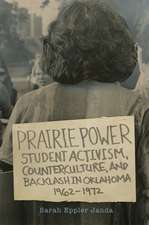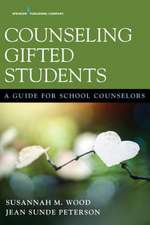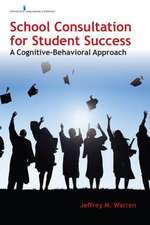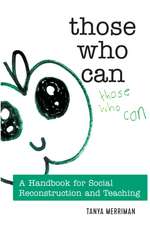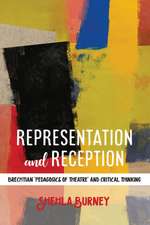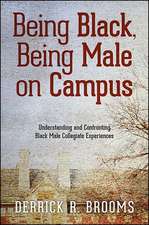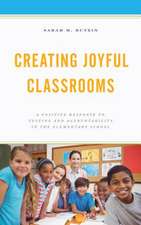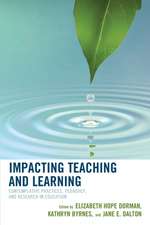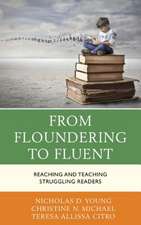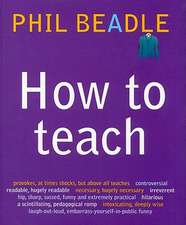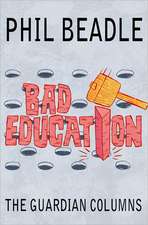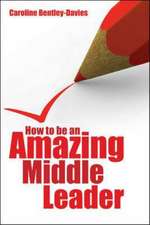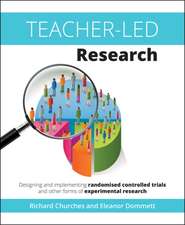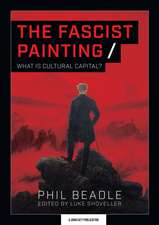The Book of Plenary: How to Teach (Independent Thinking)
Autor Phil Beadleen Limba Engleză Paperback – 25 aug 2013
The Book of Plenary is the first in Phil Beadle’s ‘How to Teach’ series, in which he examines – in detail – every aspect of the modern classroom. The first half of this volume gives interested teachers a series of easy-to-set-up activities that make plenaries engaging and worthwhile.
Preț: 97.39 lei
Nou
Puncte Express: 146
Preț estimativ în valută:
18.64€ • 20.26$ • 15.67£
18.64€ • 20.26$ • 15.67£
Carte disponibilă
Livrare economică 01-15 aprilie
Livrare express 15-21 martie pentru 20.25 lei
Preluare comenzi: 021 569.72.76
Specificații
ISBN-13: 9781781350539
ISBN-10: 1781350531
Pagini: 164
Ilustrații: illustrations
Dimensiuni: 145 x 178 x 10 mm
Greutate: 0.25 kg
Editura: Crown House Publishing
Seria How to Teach (Independent Thinking)
Locul publicării:United Kingdom
ISBN-10: 1781350531
Pagini: 164
Ilustrații: illustrations
Dimensiuni: 145 x 178 x 10 mm
Greutate: 0.25 kg
Editura: Crown House Publishing
Seria How to Teach (Independent Thinking)
Locul publicării:United Kingdom
Cuprins
Introduction
Part 1 An Overview of the Plenary
Part 2 Analogue Plenaries
1 Don’t Share the Objectives Until the End
2 Start with a Gag
3 A Pyramid of Plenary
4 Show Me the Money
5 Pick On Two Students
6 Extended Abstraction
7 What is the Exact Opposite of What You Have Learnt in This Lesson? .
8 The Frozen Picture
9 Mime the Learning
10 Key Word Storytelling
11 Key Word Definition Matching
12 Pelmanism
13 Do It Yourself Will Ya?
14 Quizzes
15 Taboo™
16 Drinking Games
17 Spot the Deliberate Mistake
18 Re-ordering or Re-sequencing a Text
19. What’s the Question?
20 Diagrammatic Representation
21 Spaced Repetition
22 The Plenary of Plenaries
Part 3 Metacognition for Beginners
Part 4 Digital Plenaries .
1 Homework’s Holy Grail
2 Organising and Transforming
3 Self-Consequences and 13. Imagery
4 Self-Instruction
5 Self-Evaluation
6 Help-Seeking
7 Keeping Records
8 Rehearsing and Memorising
9 Goal-Setting/Planning
10 Reviewing Records
11 Self-Monitoring
12 Task Strategies
14 Time Management
Potentially Useful Resources for Spods
Bibliography
Index
Part 1 An Overview of the Plenary
Part 2 Analogue Plenaries
1 Don’t Share the Objectives Until the End
2 Start with a Gag
3 A Pyramid of Plenary
4 Show Me the Money
5 Pick On Two Students
6 Extended Abstraction
7 What is the Exact Opposite of What You Have Learnt in This Lesson? .
8 The Frozen Picture
9 Mime the Learning
10 Key Word Storytelling
11 Key Word Definition Matching
12 Pelmanism
13 Do It Yourself Will Ya?
14 Quizzes
15 Taboo™
16 Drinking Games
17 Spot the Deliberate Mistake
18 Re-ordering or Re-sequencing a Text
19. What’s the Question?
20 Diagrammatic Representation
21 Spaced Repetition
22 The Plenary of Plenaries
Part 3 Metacognition for Beginners
Part 4 Digital Plenaries .
1 Homework’s Holy Grail
2 Organising and Transforming
3 Self-Consequences and 13. Imagery
4 Self-Instruction
5 Self-Evaluation
6 Help-Seeking
7 Keeping Records
8 Rehearsing and Memorising
9 Goal-Setting/Planning
10 Reviewing Records
11 Self-Monitoring
12 Task Strategies
14 Time Management
Potentially Useful Resources for Spods
Bibliography
Index
Recenzii
I found Phil Beadle's latest book, which focuses upon the importance of 'plenaries' -- the summing up of learning in a lesson -- really useful and engaging as well. If I'm honest, it's a part of my teaching repertoire that I could do with significantly improving since too often I don't plan for my plenaries in a satisfactory fashion. Phil shows how the latest educational research by experts like Hattie, Wiliam and host of other teachers indicates that when you get the plenary right you attain much better results and improve children's learning generally. I really like the no-nonsense tips like ending lessons with the learning objectives and starting with a gag; they're workable and don't involve tonnes of preparation. As ever with Phil's books -- and work generally -- thoroughly recommended. He's a very rare voice of sanity and good fun in an increasingly dogmatic and dispiriting educational landscape.
Francis Gilbert author of 'I'm A Teacher, Get Me Out Of Here',
Notă biografică
Phil Beadle teaches sentence structure through football skills, analyses poetry by dancing the verbs and is most renowned for teaching punctuation through kung fu moves, and teaching adults to read with space hoppers. He teaches English at a school in London and travels internationally indoctrinating teachers into being interesting.
Author web site:
www.philbeadle.com
www.independentthinking.co.uk/Who/Associates/Phil+Beadle/default.aspx
Author web site:
www.philbeadle.com
www.independentthinking.co.uk/Who/Associates/Phil+Beadle/default.aspx
Extras
Introduction
G. K. Chesterton (G. K. Chesterton, Orthodoxy (Mineola, NY: Dover, 2004), 1.) once wrote that he was ‘too ready to write books on the
feeblest provocation’. It is reasonable to suggest that the existence of the
transiently useful artefact you are now holding could be evidence that the
same accusation could be levelled at its author.(As Alastair Smith brilliantly puts it: ‘I like self-deprecating humour … I’m just not very good at it.’)
This book is an experiment to see if it is possible to make something – a
thing that is (perhaps), by nature, intrinsically boring – in some way interesting.
(This could reasonably be argued to be the mark of a decent teacher.)
So, it is a challenge I have set myself: is it possible to spend a few months
immersed in the shallow puddle of the plenary, and come out holding some
form of brittle petal that will not only help you, dear colleague, to improve
your practice, but will also entertain?
The process of writing this thin volume has been to read everything ever
written about the plenary, and try to turn it into a series of workable jokes.
And then, having failed to do so, to tell you about the best strategies, and
how you might go about implementing them; as well as which ones you
should avoid, because they are either stupid (see the anagram and the wordsearch), or because they are merely a marginal, incremental repetition of
some non-idea (see both the anagram and, indeed, the wordsearch). But
before we go into the useful arena of the practical aand specific, let’s briefly
divert into a more ‘big picture’ look at the plenary.
By the end of this chapter (I hope) you will be able to:
1 Identify and articulate what your students will get out of a well conducted
plenary.
2 Regurgitate what Ofsted have to say about plenaries and, in particular,
where they think we are going wrong.
3 Clarify what you think about certain aspects of planning a plenary
(relating the plenary to the objectives, starting with a plenary, mini
plenaries) – good or bad.
4 Relate to the problems that your students might have with plenaries,
and have strategies to overcome these.
5 Use the plenary as an effective part of your already well-developed
Assessment for Learning (AfL) strategies.
6 Relate your understanding of the plenary to what Professor John Hattie
has to say about the end of the lesson.
7 Be marginally better read on the subject of domain specificity than
your colleagues and, perhaps, have an opinion as to whether domaingeneral
and domain-specific ideas of cognition are mutually exclusive
or not. (This may not make any sense to you now. And it may not
make any sense to you later on.)
And that’s just Part 1.
Organisationally, the book has been constructed (if that is not too baroque
a term for such a short tome) with in-built differentiation at its core. The
majority of readers will want a brief overview of how one might most profitably
conduct a plenary (this is in Part 1: An Overview of the Plenary), and a
few decent ideas on easy strategies to use that may have some benefit for
their students (this is in Part 2: Analogue Plenaries). If your needs have been
fulfilled by these two sections, I’d advise you not to bother going any further,
as the second half of this book is heavy going if you are not of a mind to try
and understand some nearly difficult stuff.
For the gifted and talented reader(s) – teaching spods, bloggers, CPD coordinators
and assistant and deputy heads in charge of teaching and learning
– there is an acknowledgement that writing a book, however short, on a
metacognitive activity and not brushing on metacognition would be an act
of professional negligence (it is therefore covered, albeit clumsily, in Part
3: Metacognition for Beginners). Where the book begins to fly a little, and
where it is, I feel, potentially useful is in Part 4: Digital Plenaries. Many of
these ideas will appear, and indeed are, simple. I’d say that this is not necessarily
a reason to write them off, as it is rarely simplicity that is the enemy
in teaching. It is in this section that I have attempted to translate my reading
of the research into strategies that, plausibly, might have a substantial
impact on the students’ learning in your specific domain.(If you understand that this is a joke (albeit an unfunny one), then you should definitely read
Parts 3 and 4.)
3
Textul de pe ultima copertă
If you buy only one book on metacognitive strategies for the last ten minutes of the
lesson this year, make it this one!
The Book of Plenary is the first in Phil Beadle’s ‘How to Teach’ series, in which he examines – in detail – every aspect of the modern classroom. The first half of this volume gives interested teachers a series of easy-to-set-up activities that make plenaries engaging and worthwhile.
The second half is a detailed and almost serious examination of metacognition in the classroom. It seeks to give teachers the stimulus to prepare and research plenaries fully so that they actively seek to develop the metacognitive experience, knowledge and self regulation of students. Distanced from glib ‘learn-to-learn’ programmes, this book engages with available research about metacognition and presents its relevance to the classroom in a lively, although sometimes childish, manner.
Phil Beadle is an English teacher and a former National Teaching Awards United Kingdom Secondary Teacher of the Year. He has also won two Royal Television Society Awards - for Channel 4’s The Unteachables and Can’t Read Can’t Write. He is the editor/author of the ‘How to Teach’ series, a series of books which cover every element of classroom practice in a highly practical, but wildly irreverent, manner.
Descriere
The only book full of ideas for lesson plenaries you’ll ever need.

